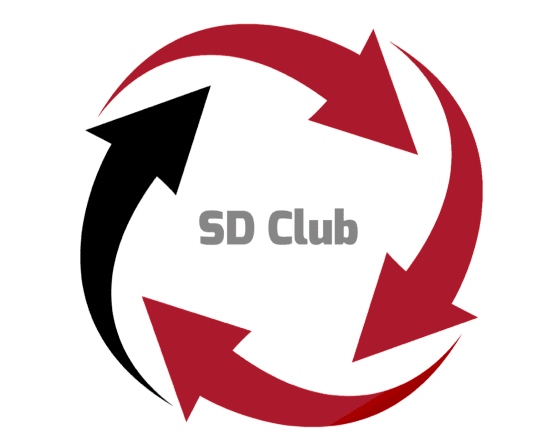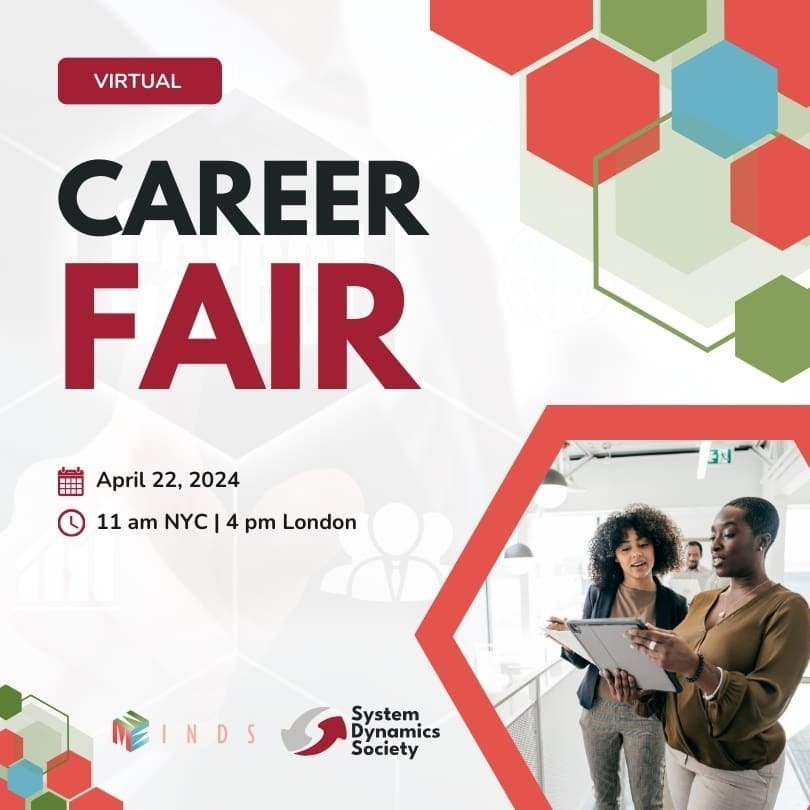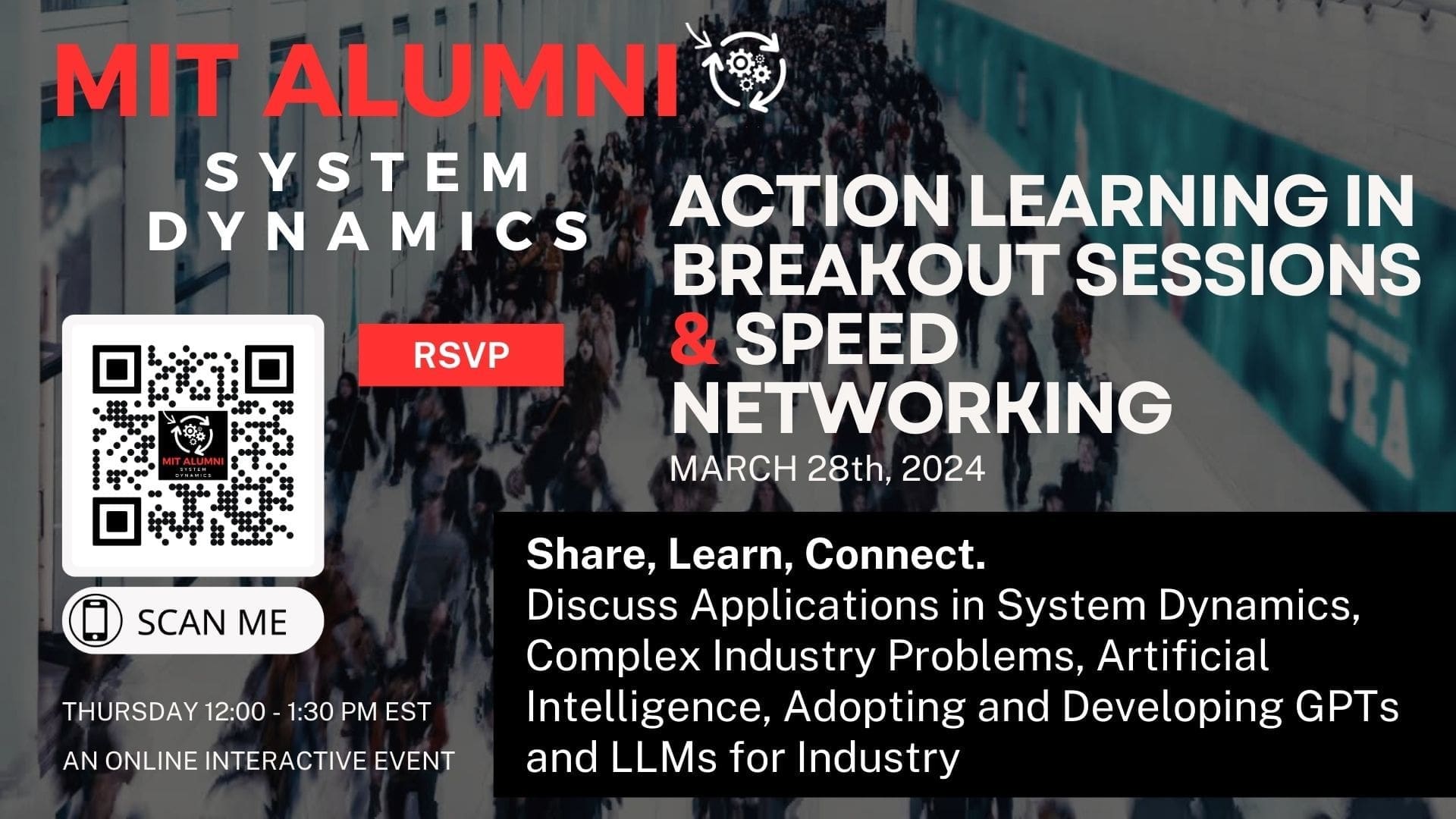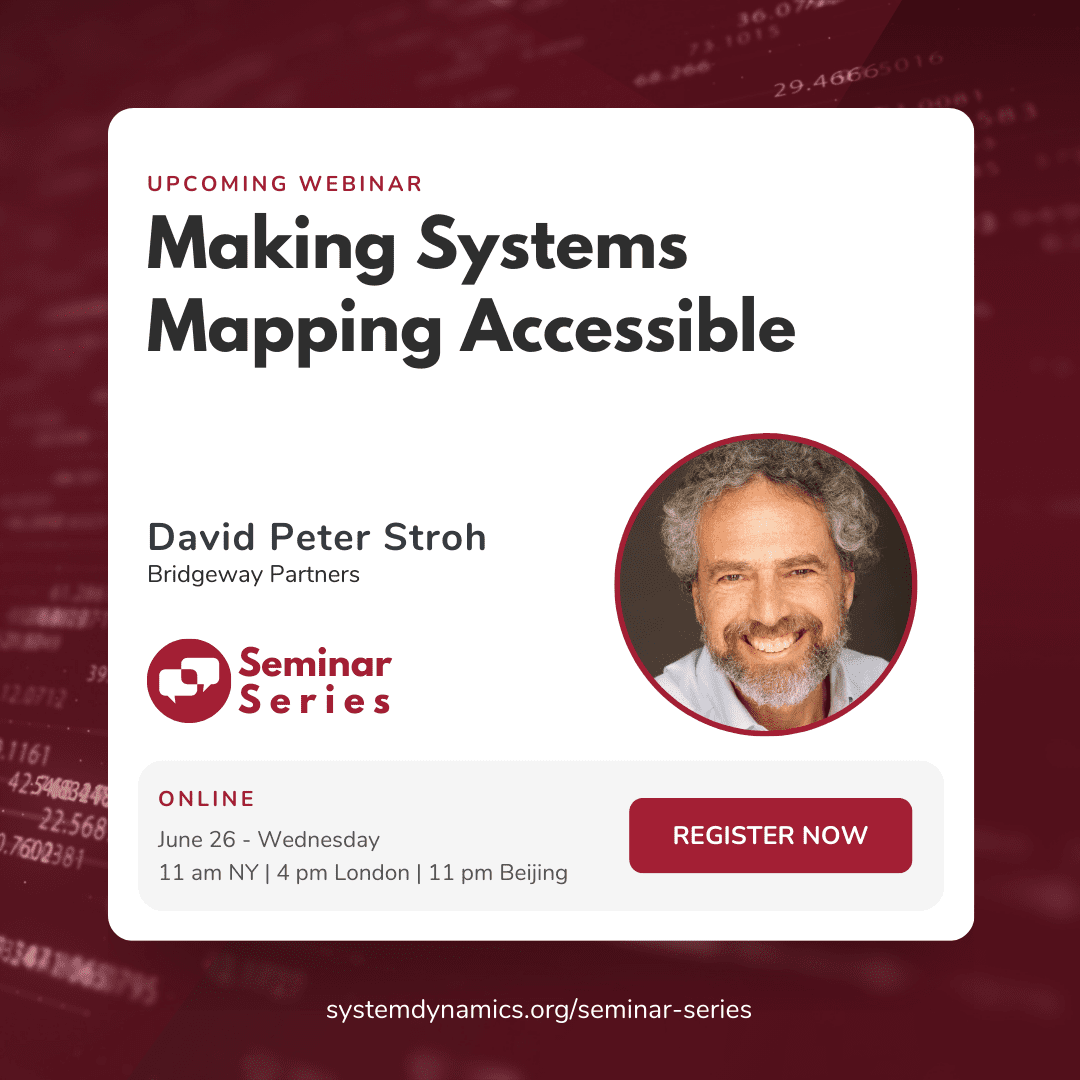MIT System Dynamics Seminar | Work Faster? Put in Longer Hours? An Assessment of Reactive Resilience Policies in Supply Chains
Please visit the MIT System Dynamics Seminars page for more information.
You are invited to attend a supplemental System Dynamics seminar being held on Tuesday, April 23rd from 12:00-1:00pm EST in the Jay W. Forrester conference room, E62-450, or via Zoom: https://mit.zoom.us/j/91800701005 (Password: SDSP24). Our guest speakers will be Nitin Joglekar (Boston University), Mukesh Kumar and Naoum Tsolakis (University of Cambridge) presenting Work Faster? Put in Longer Hours? An Assessment of Reactive Resilience Policies in Supply Chains (see abstract and authors’ info below). Lunch will be provided to those attending in person and a reminder email sent out closer to the date.
Abstract
We assess triple disruptions (reduced upstream and downstream capacities, and increased demand) in supply chains by analyzing reactive resilience trade-offs between costs and benefits. Reactive resilience refers to considering short duration alternatives within existing supply chain configurations (e.g., working overtime, job reassignments, speeding up adjustment times, and reducing inventory coverages). Our work highlights behavioral issues around fairness and equity for the workforce under such adverse scenarios. The point of departure for our work is fieldwork before, during, and after COVID-19 disruptions in a fish supply chain. We develop a system dynamics simulation model that builds on the classic beer game structure to set up a novel Cost-Adjusted Continuity (CAC) metric to account for cost-benefit trade-offs. We find that: (1) differing emphasis, and allied mental models, on reducing either inventory cost or labor cost (or both), crucially affects CAC outcomes; (2) working harder (putting in longer hours, under isolation) creates burnout. Job redesign with fair assignments can address this burnout issue and improve CAC outcomes; (3) Double disruption (i.e., introducing a capacity constraint either upstream or downstream in the supply chain, joint with increased demand) has an asymmetric impact on reactive resilience governance choices, when compared to triple disruptions. CAC governance based on multiple disruptions need not align with single disruption policies examined in a classic beer game.
We will end this talk with by discussing opportunities in reactive resilience research within the context of current debates on enhancing and monitoring resilience in supply chains.
Authors
Nitin Joglekar works at the intersection of AI, Design (of Products and Supply Chains) and allied Ethical issues at Boston University. He recently edited a special issue of the Production and Operations Management Journal on managing pandemics. https://people.bu.edu/joglekar
Mukesh Kumar heads the Industrial Resilience Research Group at the University of Cambridge, UK. Currently, he is running Global Supply Chain Observatory project, together with Google, on monitoring resilience. https://www.ifm.eng.cam.ac.uk/people/mk501/
Naoum Tsolakis is with the Institute for Manufacturing (Cambridge, UK) and is an Assistant Professor at the International Hellenic University in Greece. His works on AI and Intelligent Systems in Logistics and Supply Chains. https://www.ifm.eng.cam.ac.uk/people/nt377/
MIT System Dynamics Seminar | Approaches to Encouraging Health Exchange Participation
You are invited to attend the System Dynamics Seminar being held on Friday, April 26th from 12:30-2:00pm EST in the Jay W. Forrester conference room, E62-450, or via Zoom: https://mit.zoom.us/j/94114971874 (Password: SDSP24). Our guest speaker will be Soheil Ghili (Yale University) presenting Approaches to Encouraging Health Insurance Takeup (see abstract and brief bio below; announcement and paper attached). Lunch will be provided to those attending in person and a reminder email will be sent out closer to the date.
If you would also like to schedule a 30-minute 1:1 meeting with him before or after the seminar, please fill out the following link by COB Friday, April 19th and I will confirm times and location with a calendar invite: https://rallly.co/invite/zVH4Rg1mCMRB. Please notify me if you need to meet over Zoom instead.
Abstract
The effectiveness of inducements to participate in health insurance exchanges, be those inducements of the Affordable Care Act (ACA) or of the Republican proposals to replace the ACA mandate, are an empirical matter. We study participation and welfare under different policies. We depart from the fully rational model of insurance; this decision is motivated by the fact that, under ACA rules, millions remain uninsured despite the heavy premium subsidies, often declining almost free coverage. We estimate the role of different frictions to participation, such as: uncompensated care, myopia and distaste for complying with the ACA mandate. Given these frictions we solve the equilibrium in the exchanges under various government interventions: subsidies, pricing regulations, individual mandate penalties, and dynamically based penalties. We find that the main friction is myopia. Although subsidies are necessary for the market under current rules not to collapse, subsidies would not be necessary absent myopia. Contrary to previous findings risk pricing does quite well, aided by subsidies and uncompensated care. Barring those, risk pricing would deliver very low welfare, due to reclassification risk.
Soheil Ghili is an assistant professor of Marketing at Yale School of Management. His main research interests are industrial organization and quantitative marketing. His recent research has examined optimal pricing strategies, with a focus on second-degree price discrimination mechanisms such as nonlinear pricing and product bundling. Methodologically, I use a combination of econometrics, micro-economic theory, and experiment design.
MIT System Dynamics Seminar | Economic Complexity, Diversification and Green Supply Chains
Please visit the MIT System Dynamics Seminars page for more information.
You are invited to attend the System Dynamics Seminar being held on Friday, April 19th from 12:30-2:00pm EST in the Jay W. Forrester conference room, E62-450, or via Zoom: https://mit.zoom.us/j/94114971874 (Password: SDSP24). Our guest speaker will be Muhammed Yildirim (Harvard Growth Lab) presenting Economic Complexity, Diversification and Green Supply Chains (see abstract and brief bio below; announcement attached). Lunch will be provided to those attending in person and a reminder email will be sent out closer to the date.
If you would also like to schedule a 30-minute 1:1 meeting with her before or after the seminar, please fill out the following link by COB Friday, April 12th and I will confirm times and location with a calendar invite: https://rallly.co/invite/Ztq0drVIo7gO. Please notify me if you need to meet over Zoom instead.
Abstract
To decarbonize, the world needs to rapidly scale supply chains for green products. This offers countries and regions economic opportunities, but these economic opportunities are path dependent, based on existing industries, capabilities and knowhow present in a location. Economic complexity is a method that lets us measure places’ diversification opportunities and capabilities, and how well places’ capabilities match with specific opportunities and products. In this presentation, I will explain the economic complexity approach, use it to explore the properties of green supply chain products, analyze diversification opportunities of countries, and analyze how announced green investment projects in the US fit with regional economies.
Muhammed A. Yildirim serves as the Director of Academic Research at the Harvard Growth Lab and holds the position of Associate Professor of Economics at Koç University (currently on leave). He earned his Ph.D. from Harvard University and a BS degree from the California Institute of Technology. Prior to joining the faculty at Koç University, he was a postdoctoral fellow at the Center for International Development at Harvard University. His research primarily focuses on understanding network and spillover effects across various research domains, including industrial policy, international trade, productivity, economic growth, and matching. Dr. Yildirim received the Marie Skłodowska-Curie Individual Fellowship in 2015, the Young Scientist Award (BAGEP) from the Science Academy in Turkey in 2021, and Koç University’s College of Administrative Sciences and Economics Outstanding Faculty Award in 2021.
Networking Session – (Natural) Resource Sharing
Please join us online Tuesday, April 30th 8PM ET (Boston time. Here is a time converter). See the “Join” button at the bottom of this page for the meeting link.
In this Collective Learning Meeting (CLM), WPI System Dynamics, the SDS Environmental SIG, Water SIG and Transboundary Groundwater Resilience (TGR) Network of Networks will co-host a
Networking Session – (Natural) Resource Sharing
We will have a round of introductions and then discuss
- Sharing System Dynamics literature, models, etc. (Some of which may be on sharing natural resources!)
- Sharing other types of resources (e.g. data, one’s time to serve one’s professional or academic community, etc.)
- Anything else the group wishes
We will not record this session but will take notes and share them. You can view the frequently asked questions (FAQ) from these sessions and more on our website.
If you are interested in presenting your work in a future CLM, please contact Christine Tang (ctang@wpi.edu).
Tentative Schedule
https://wp.wpi.edu/lcsap/events/collective-learning-meetings-clm/
Telephone details: https://bit.ly/CLM-2024-04-30
Virtual Career Fair by MINDS & SDS
The Master students in System Dynamics at the University of Bergen, in partnership with the System Dynamics Society, are excited to host an enriching Virtual Career Fair. This event is designed to connect students, alumni, and professionals in the field of System Dynamics with leading organizations.
- Date: Monday, April 22, 2024
- Time: 11:00 am NYC | 4 pm London | Time Converter
- Location: Online (Zoom Virtual Meeting)
This virtual fair offers an innovative platform where participants can interact with multiple companies in separate break-out rooms. These rooms provide a space for attendees to engage in meaningful discussions with company representatives. Participants will have the opportunity to navigate freely between rooms, allowing for a diverse and comprehensive career fair experience.
Zoom Link: https://uib.zoom.us/j/62696138409?pwd=a0RWTUMvRHNxd2FidXIxakVpdHFxdz09
Join As an Organization
To join as a participating organization, please register via our Organization Registration Form. This is an opportunity to meet potential candidates and showcase your company’s culture and career opportunities.
MIT System Dynamics Seminar | Strategic Investments for Platform Launch and Ecosystem Growth
Please visit the MIT System Dynamics Seminars page for more information.
You are invited to attend the System Dynamics Seminar being held on Friday, April 12th from 12:30-2:00pm EST in the Jay W. Forrester conference room, E62-450, or via Zoom: https://mit.zoom.us/j/94114971874 (Password: SDSP24). Our guest speaker will be Burcu Tan (Anderson School of Management, UNM) presenting Strategic Investments for Platform Launch and Ecosystem Growth: A Dynamic Analysis (see abstract and brief bio below; announcement attached). Lunch will be provided to those attending in person and a reminder email will be sent out closer to the date.
If you would also like to schedule a 30-minute 1:1 meeting with her before or after the seminar, please fill out the following link by COB Friday, April 5th and I will confirm times and location with a calendar invite: https://rallly.co/invite/CI5nD2MSCPLB. Please notify me if you need to meet over Zoom instead.
Abstract
Multi-sided platforms must make decisions on both pricing and engineering investment and must continually adjust them as the platform scales over its lifecycle. Engineering investments can be allocated to features that improve a platform’s standalone value, social features to take advantage of same-side network effects, or integration tools and boundary resources to facilitate third-party content creation. Guidance in the academic or practitioner literature is not granular. Moreover, relevant normative economic models that consider externalities are rarely dynamic. Hence, there is a gap in knowledge about how to best balance tradeoffs between different strategic decisions throughout the entire platform lifecycle. To begin to address this gap, we explore normative strategies for coordinating pricing and engineering investment decisions on a continuous basis under different ecosystem conditions. We build a simulation model informed by economics and marketing theory and perform extensive sensitivity analyses on key parameters in different ecosystem scenarios over a multi-period lifecycle. We find that pricing and investment strategies must continuously change to perform optimally. In particular, strategies that are most effective at launch often differ from those that are most effective during scaling as well as those most effective at maturity. We also find that the optimal strategy depends strongly on the monetization model and market aversion to price changes. Lastly, we specifically examine four different industry segments: mobile platforms, social media, the sharing economy, and business-to-business. The results provide evidence that the trajectory of platform pricing and investment strategies should greatly differ depending on industrial context.
Brief Bio
Burcu Tan (btan@unm.edu) is an Associate Professor at Anderson School of Management, University of New Mexico. She holds a Ph.D. in Operations Management from the University of Texas at Austin and a BSc. and MSc. in Industrial Engineering from Bogazici University. Her research interests include digital platforms, supply chain management, socially responsible operations, and system dynamics. Her work has been published in Information Systems and Operations Management journals such as Information Systems Research, Journal of Management Information Systems, and Production and Operations Management. She is a Senior Editor at Production and Operations Management.
MIT System Dynamics Seminar | The remarkable universality of technology growth suggests that the green energy transition will happen quickly
Please visit the MIT System Dynamics Seminars page for more information.
You are invited to attend the System Dynamics Seminar being held on Friday, April 5th from 12:30-2:00pm EST in the Jay W. Forrester conference room, E62-450, or via Zoom: https://mit.zoom.us/j/94114971874 (Password: SDSP24). Our virtual guest speaker will be J. Doyne Farmer (Oxford Martin School) presenting The remarkable universality of technology growth suggests that the green energy transition will happen quickly (see abstract and brief bio below; announcement attached). Lunch will be provided to those attending in person and a reminder email will be sent out closer to the date.
If you would also like to schedule a 30-minute 1:1 meeting with him before or after the seminar, please fill out the following link by COB Friday, March 29th and I will confirm times and location with a calendar invite: https://rallly.co/invite/sVOs8NoOgYkn. Please notify me if you need to meet over Zoom instead.
Abstract
How fast will the green energy transition happen? To address this question we assembled a database on the deployment of 42 technologies, ranging from railroads to the internet. When the individual time series are rescaled to have the same rates and levels, they have a universal form that is very close to a standard logistic S-curve. Although each technology’s rate of deployment varies due to many factors, the universal S-curve explains most of their behavior. We show that S-curve time series present challenges including autocorrelation, heteroscedastic noise and parameter bias, and develop a probabilistic method for forecasting deployment that takes these into account. Application to the time series for wind and solar energy suggest that we have still not reached rates of maximum deployment, and that the green energy transition is likely to happen surprisingly quickly.
Brief Bio
J. Doyne Farmer is Director of the Complexity Economics program at the Institute for New Economic Thinking at the Oxford Martin School, Baillie Gifford Professor in the Mathematical Institute at the University of Oxford and an External Professor at the Santa Fe Institute. His current research is in economics, including agent-based modeling, financial instability and technological progress. He was a founder of Prediction Company, a quantitative automated trading firm that was sold to the United Bank of Switzerland in 2006. His past research includes complex systems, dynamical systems theory, time series analysis and theoretical biology. He was an Oppenheimer Fellow and the founder of the Complex Systems Group at Los Alamos National Laboratory. While a graduate student he built the first wearable digital computer, which was successfully used to predict the game of roulette
MIT Alumni System Dynamics: Action Learning in Breakout Sessions & Speed Networking
In this two-part online interactive event, spend the first half exploring topics and open discussions in short breakout sessions led by breakout leaders and room participants on system dynamics, real-world applications, and the adoption of artificial intelligence, including GPTs and LLMS. Each topic will be rotated every 10 minutes. The remaining session will become an interactive automated speed networking breakout.
We encourage you to participate, share, and ask questions. All experiences are welcome, and you don’t need to be an experienced System Dynamics practitioner or academic.
To register, RSVP, or learn more, visit the event page: https://www.masd-events.xyz/
Making Systems Mapping Accessible
June 26 at 11 am NY | 4 pm London | 11 pm Beijing | Time Converter
Ivan Taylor on “Building System Dynamics Models in Microsoft Excel”
Please join us online Friday, March 29th 11AM ET (Boston time. Here is a time converter).
In this Collective Learning Meeting (CLM), WPI System Dynamics will host Dr. Ivan Taylor (ivan@policydynamics.ca) who will present
Building System Dynamics Models in Microsoft Excel
Short Description: Discover the step-by-step process of creating System Dynamics models using Microsoft Excel. Learn how to apply Excel to accurately represent real-world systems using System Dynamics models.
Biography: Ivan Taylor worked as a Defence Scientist in the Centre for Operational Research in Defence Research and Development Canada for over 33 years. He is President and Senior Researcher at Policy Dynamics Inc., established in 2001 (www.policydynamics.ca). He is a member of the System Dynamics Society since 1997 where he is a one-on-one mentor to young people Worldwide. He is also a member of the Canadian Operational Research Society and the International Council on Systems Engineering (INCOSE). He is the Director of Membership of INCOSE Canada. He has a PhD in Public Policy and an MSc in Information and Systems Science from Carleton University in Ottawa. He recently worked with the US Army to develop policies to reduce soldier suicides and is currently working with a construction company in Southern Ontario on Indigenous Engagement and Inclusion. There is more information on his LinkedIn page https://www.linkedin.com/in/ivantaylor/.
Question for the Audience
Would the use of Excel to implement System Dynamics models help you communicate with laypeople?
We will record this session and post it on the WPI SD Club YouTube channel for the public.
If you are interested in presenting your work in a future CLM, please contact Christine Tang (ctang@wpi.edu).
Call-in details: https://bit.ly/CLM-2024-03-29





